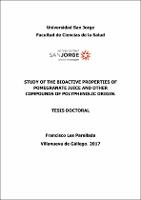Please use this identifier to cite or link to this item:
https://repositorio.usj.es/handle/123456789/168
| Title: | Study of the bioactive properties of pomegranate juice and other compounds of polyphenolic origin |
| Authors: | Les, Francisco



|
| metadata.dc.contributor.affiliation: | Universidad San Jorge |
| Keywords: | Sector de la salud; Farmacología; Farmacognosia; Fitofarmacos |
| Issue Date: | 2019 |
| Abstract: | In recent years, there has been a general interest in functional foods as strategies to improve health status and prevention of ageing-related diseases. In this sense, certain plant foods contain bioactive constituents with physiological effects in our organism. Among these phytochemicals, polyphenols are of great importance because they act as antioxidants preventing cellular ageing and they can modulate pharmacological targets in relation with neurodegenerative or metabolic diseases. Pomegranate (Punica granatum) and its juice are foods with high polyphenol content, being a natural source of bioactive molecules with therapeutic potential to prevent ageing-associated diseases. In addition, other compounds such as piceatanol and resveratrol and plant extracts with high polyphenolic content such as Helichrysum stoechas, Cotoneaster pannosus and Hypericum androsaemum have been studied. The current use of these compounds and products corresponds in many cases to a social trend or traditional use without scientific evidence. Therefore, in this project, studies were carried out through collaborations with several research groups in order to evaluate the potential applications that these products could have in the pharmaceutical, cosmetic and agro-food sectors. The development of the doctoral thesis focuses mainly on the study of pomegranate juice and its main compounds with experiments related to oxidative stress and adipose tissue. In addition, a screening of activities of different plants extracts with high polyphenolic content or pure reference polyphenols was carried out in order to obtain evidence of their properties to contribute to a better knowledge of metabolic, antioxidant and neuroprotective effects, using different in vitro methodologies such as enzymatic inhibitions, cell cultures or gene expression. The results confirmed the presence of a high polyphenolic content of the different plants, as well as potential bioactive properties, highlighting their antioxidant and antiproliferative activities, and the ability to inhibit relevant enzymes of the nervous system such as monoamine oxidase A and tyrosinase, and metabolic such as lipase, α-glucosidase and dipeptidyl peptidase-4. In addition, the results obtained for pomegranate juice in relation to the metabolic syndrome showed anti-adipogenic properties in a dose-dependent manner, since they reduced the accumulation of triglycerides and the expression of the main genes related to the formation of adipocytes such as adiponectin, PPARγ, GLUT4 and FABP4 in the 3T3-L1 cell line, and antiadipogenic and antilipolytic properties in human adipose tissue. We can conclude that these results may explain the potential beneficial effects of different plants and their main polyphenols in the prevention of disorders associated with oxidative stress, serving as a basis for further studies. |
| URI: | https://repositorio.usj.es/handle/123456789/168 |
| Appears in Collections: | Facultad de Ciencias de la Salud |
Files in This Item:
| File | Description | Size | Format | |
|---|---|---|---|---|
| Study of the bioactive propierties.pdf | 2,07 MB | Adobe PDF |  View/Open |
This item is licensed under a Creative Commons License

